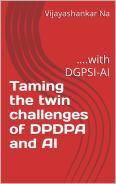P.S: This is not a post on Cyber Law and I apologize for the diversion. But I as a citizen of India have my views on some of the recent developments and want to use this platform to record the same. You may ignore it if you donot like. This is prompted by the returning of the awards by many prominent persons which trend has now percolated into the community of scientists. Just as Scientists are also humans and as citizens of India have the right to express their views, I also have my right to express my views and criticize these persons for their action. I am exercising this option.
I was today pleasantly surprised with a report in dnaindia.com where it was stated that an international organization by name “Freedom House”, in its report stated that Internet Freedom in India has improved under the Modi led Government in India. I am not aware of this organization and its credibility but since the view goes with my own view of the Government’s in India since my student days when we saw the pre-Emergency days and followed up with the Emergency days and there after to Sonia Gandhi’s proxy rule, I tend to agree with the report and take this opportunity to add some thoughts on the other burning issue in our media now namely the #Awardwapsi craze.
If we go by the media reports and the noise made by political leaders from the opposition, it appears that India is going through a great time of suppression of freedom and intolerance all because NDA has a majority of 282 Loksabha seats. After the FTII students and Sahitya Akademi winners it is now the turn of scientist community lead by Mr P M Bharghava to return their awards expressing their “Concern” for the “Intolerance” that is prevalent in the society.
The media is holding out as if this is a reflection on the functioning of the Modi Government which on the other hand is going great guns with its African Summit and Easing of Business objectives.
The opposition that is being raised comes bang in association with the Bihar elections and one has to be naive not to see the effort to create a negative PR for the BJP.
In this entire exercise it is the intellectual credibility of these “Award Returnees” that has come in to the public glare. They are reflecting their level of intolerance to a non Congress Government being at the helm and their favourite parties in the opposition becoming irrelevant by the day for reasons of their own.
I suppose that this fervour for returning the awards may wane after the Bihar elections and even those who have announced returning of the awards may not actually return them. I therefore call upon the Government to set up a committee of auditors to follow up the media announcements made by these awardees and create a smooth system for their returning of their awards. They can be collected and put up in a museum. Along with the return of the medals, it is also necessary for these awardees to return the cash benefits they have received which can be put in a fund .
After the disclosures of Netaji Files and other historical documents that were so far buried under a veil of secrecy, it is clear that what we were fed so far as Indian History was a doctored version and Congress must be blamed for its role in hiding the truth from public. Some of these grey haired intellectuals who are showing intolerance were perhaps aware of these doctoring of Indian history and it makes me sad that they did not have any opposition for this fraud on the Indian society.
I am therefore not unhappy that these people are returning their awards and would like these returns to be meaningful and this event can be preserved as a part of the transformation that is happening in our society now. Hence the returned trophies deserve to be placed in a museum and public should know who are and who are not with the current transformation from the dynastic rule of the Congress family to the Modi led BJP rule.
Naavi






